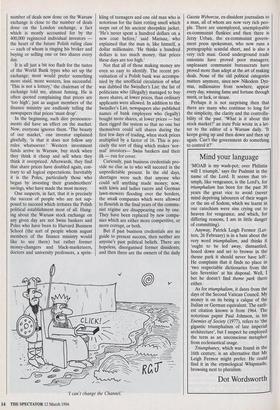Mind your language
'MOAB is my wash-pot; over Philistia will I triumph,' says the Psalmist in the name of the Lord. It seems that tri- umph, like vengeance, is the Lord's, for triumphalism has been for the past 30 years the great vice to avoid (never mind depriving labourers of their wages or the sin of Sodom, which we learnt in our catechism were sins crying out to heaven for vengeance, and which, for differing reasons, I am in little danger of committing).
Anyway, Patrick Leigh Fermor (Let- ters, 26 February) is in a bate about the very word triumphalism, and thinks it `ought to be led away, dismantled, hosed down and set to browse in the theme park it should never have left'. He complains that it finds no place in `two respectable dictionaries from the late Seventies' at his disposal. Well, I bet he doesn't find theme park there either.
As for triumphalism, it dates from the days of the Second Vatican Council. My money is on its being a calque of the Italian or German equivalent. The earli- est citation known is from 1964. The notorious papist Paul Johnson, in his Enemies of Society (1977), refers to 'the gigantic triumphalism of late imperial architecture', but I suspect he employed the term as an unconscious metaphor from ecclesiastical usage. Triumphancy, which was found in the 16th century, is an alternative that Mr Leigh Fermor might prefer. He could find it in the etymological Whipsnade, browsing next to pluralism.
Dot Wordsworth


















































 Previous page
Previous page